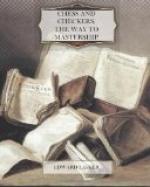Even a Chess master once said, that generalities are of no use in Chess and that it is necessary to figure out every move in all variations to which it may lead to make sure that the move is good. As an example he offered the following opening: (1) P-f3, P-e5; (2) P-g4. Now, he asks, should Black omit to give the checkmate with Q-h4 because it is against the general principles to bring out the Queen at an early stage of the game?
The shallowness of this argument is obvious. The reason for the general rule that the Queen should not come out too soon is that she is liable to be attacked by the minor pieces of the opponent so that she has to move again and again and time is lost which could be used for the development of other pieces. Of course, if the opponent does not develop his pieces, the Queen may often come out without danger and she may do a lot of harm before she can be driven away.
In formulating general strategical principles it is, then, assumed that both players will follow them, and it is taken for granted that if one player deviates from these principles and thereby weakens himself at some point, the other player is expected to exact the full penalty for this deviation with any means at his disposal. It will always be found that these means are also indicated by the general principles if only their meaning is intelligently applied to the position in question.
As was stated before, the point of greatest importance in the opening is to develop the pieces without loss of time, that is, to place them on squares where they have as much mobility as possible without making any move which retards this development. There are different ways in which the development may be retarded, and which consequently must be avoided. For instance, no Pawn move should be made which is not absolutely necessary to open a line for a piece; or, no piece should move twice as long as there are pieces which have not yet moved at all; or, no piece should be developed to a square from which the opponent can drive it away at the same time furthering his own development; or, the right of castling should not be foregone by moving the King or by any other way, as castling develops a Rook and places the King in safety with one move while more moves are required to the same end if castling is not possible, and so on.
The beginner who makes this great principle of development quite clear to himself has made the most difficult step on the way to mastership. The grasp of the far reaching influence of the mobility of the pieces in the opening upon the further development of the whole game is really what distinguishes the master from the average player.




